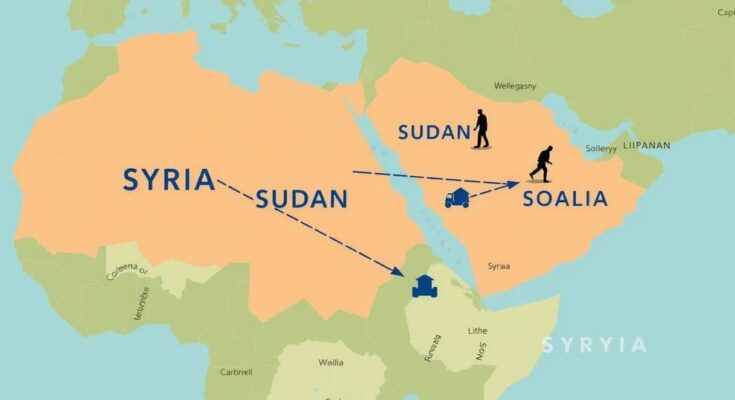The U.S. and Israel are exploring Syria, Sudan, Somalia, and Somaliland as potential new homes for Gazans. However, reactions from Arab states indicate significant opposition to these plans. Relations between Israel and these countries are complex, with leaders rejecting relocation efforts and emphasizing existing national sentiments against such measures.
The search for a new home for approximately two million Gazans continues, with the United States and Israel considering Syria, Sudan, Somalia, and Somaliland as potential destinations. Although these discussions are ongoing, initial reactions suggest that the plans may not materialize successfully. President Donald Trump previously proposed a controversial strategy, claiming the U.S. would ‘take over’ Gaza and facilitate relocation for its residents to an unspecified ‘beautiful’ area, predicting that few would wish to return post-reconstruction.
Opposition from Arab nations has been significant, with many outright rejecting the possibility of accepting Gazans. Notably, relations between Israel and the identified countries are intricate and fraught with historical tensions. For instance, the U.S. reportedly attempted to engage with Syria’s current leadership, yet relations remain strained after the Israeli government’s longstanding criticism of the Syrian regime. President Ahmad al-Shara condemned these plans, referring to them as a “serious crime that will ultimately fail.”
Efforts for collaboration with Sudan and Somalia also face significant hurdles. Sudan, despite its participation in the Abraham Accords, has recently become embroiled in a civil conflict and its military chief has clearly stated that Sudan “categorically rejects” any propositions for relocating Palestinians. Meanwhile, Somalia, which has consistently advocated for Palestinian rights, expresses skepticism about hosting Gazans, with its ambassador indicating no formal discussions have occurred with U.S. or Israeli authorities on this matter.
Somaliland presents a more promising option, albeit with its own challenges. Although it is not internationally recognized as an independent state, Somaliland has maintained stability since its declaration of independence in 1991. Existing ties with the UAE—which enjoys a cooperative relationship with Israel—could facilitate negotiations. Reports indicate that the U.S. has entertained the idea of mutual recognition in exchange for support.
Discussions about Gaza relocation continue without concrete outcomes, alongside a backdrop of strained diplomacy and regional complexities. The overall sentiment from the region remains largely skeptical regarding any plans for relocating Gazans to these nations, emphasizing the ongoing contention surrounding this issue.
In summary, the search for alternative homes for Gazans raises significant diplomatic challenges. The U.S. and Israel’s proposals to relocate Gazans to Syria, Sudan, Somalia, and Somaliland have encountered substantial opposition from regional stakeholders, leading to skepticism about their feasibility. Complex relations and historical animosities further complicate the potential for successful relocation, as most involved countries openly reject the plans while considering their own national interests.
Original Source: allisrael.com




